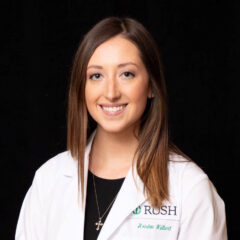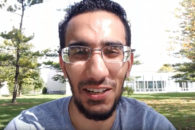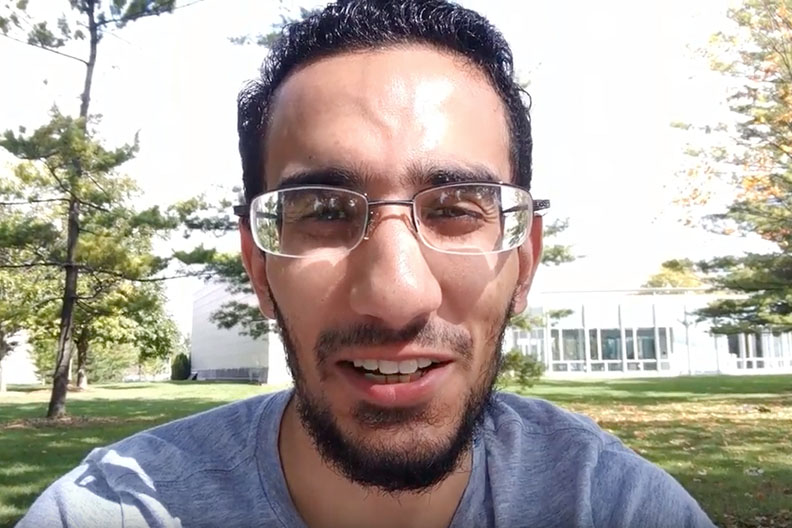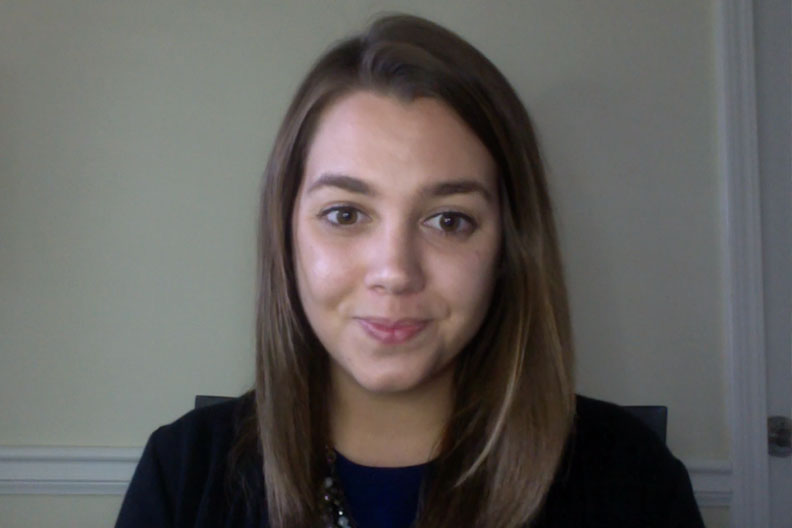Minor in Medical Humanities
The medical humanities minor (MEH) at Elmhurst University is an ideal complement to the natural science courses required for most health professions programs.
It represents an excellent way for students applying to professional health care programs to distinguish themselves from other applicants. Designed to help students develop the skills they need for humanistic health care delivery, the minor is open to any student interested in the intersection of medicine, science and caregiving as a humane art. The course of study focuses on ethical considerations in the clinician-patient relationship, as well as effective communication, integrity, excellence, compassion, altruism, respect for patients and colleagues, empathy and service.

The medical humanities minor developed my passion for honoring the intersection of medical science and the human condition. The multidisciplinary coursework and clinical experiences sharpened my ability to support and empower patients with cultural competence, mindfulness and empathy as they experience their illness narratives.
— Kristen Hulbert ’18
Students who have completed the MEH minor have gone on to pursue careers in medicine, physician assistant studies, occupational therapy, veterinary medicine and health care administration, to name a few.
Medical humanities students gain real-world experience through internships at clinical sites such as:
- Advocate Medical Group
- Athletico
- Artis Senior Living
- Easterseals
- Edward Hospital and Health Services
- Elmhurst Memorial Healthcare
- GiGi’s Playhouse
- HCR ManorCare
- Homewatch Caregivers
- NorthShore Skokie Hospital
- Northwestern Memorial Hospital
- Pekin Hospital
- Rush Copley Medical Center
- School of Expressive Arts and Learning
- St. Charles Veterinary Clinic



Medical Humanities Courses
Required Courses
- PHL 316 Biomedical Ethics
- COM 315 Intercultural Communication
- MEH 490 Medical Humanities Clinical Experience (.25 credit)
- MEH 491 Medical Humanities Seminar/Research Capstone (.50 credit)
Electives
Two courses are required from different disciplines/departments. Students can take more than one course with the MEH prefix.
- BID 300 PHL/PSY Neuroethics
- COM 326 Health Communication
- CSD 242 Towards Understanding Autism
- CSD 247 Dementia, Alzheimer’s and Related Cognitive Disorders: Principles and Practices for Health and Human Service Providers
- CSD 356 Children at Risk from Birth to Five
- CSD 381 The China Experience
- CSD 382 Global Perspectives in Communication and Disability: Costa Rica Experience
- ENG 230 Readings in Race, Class and Gender
- MEH 320 Quality/Safety in Health Care
- PH 250 A Systems Thinking Approach to the Social Determinants of Health
- PH 310 Public Health and Global Citizenship
- PHL 326 Key Themes and Thinkers in Biomedicine
- PSY 348 Health Psychology
- REL 323 Religion and Science
- REL 332 Religious Ethics and Health Care
- SOC 304 Race and Ethnic Relations
- SOC 305 Sex and Gender in Society
- SOC 216/316 Society, Health and Illness
- SPN 306 Medical Spanish
MEH electives must be selected from two different departments. At least three of the minor courses must be taken at the 300/400 level (not including the clinical experience or capstone).
Sequencing of courses in the minor is important to the overall experience and learning objectives. Students must complete two core courses (ethics and communication courses) as well as one elective course for the minor prior to MEH 490 (or one of the alternative clinical experiences). The clinical experience is a prerequisite to MEH 491 Seminar Research/Capstone, and the capstone is only offered in the spring term.
Course Descriptions
One unit of credit equals four semester hours.
In this course, which is open to students in health care majors and preprofessional health care programs, students will work collaboratively to learn about the evolution of the culture of quality and safety in health care. Students will evaluate factors that have shaped this culture change. These include areas identified by the Institute of Medicine (IOM), including safety (infection control); quality improvement; evidence-based practice; patient-centered care; informatics; and interprofessional communication, collaboration and teamwork. In addition, the course will explore relevant historical influences, systems theory, professional ethics, population health, health literacy and health care finance.
.25 credit
This course is a clinical experience involving 50 hours at an approved site. Interactions with both patients and health care professionals are important for students to develop some appreciation for working with people who are ill or infirm, for the teamwork expected of health professionals and for the seriousness of taking responsibility for the lives of others. Students maintain a reflective journal throughout the 50-hour clinical experience. The journal will include a running log of their hours as well as reflections on medical humanities and the clinical experience.
Prerequisites: junior or senior standing; completion of two core courses and one elective prior to the clinical experience; permission of the program coordinator. Also, students must meet with the program coordinator at least a semester in advance of the clinical experience. Grading option: P/NP.
CSD 476, CSD 477, KIN 450, NRS 309, and PH 440 are alternatives for MEH 490 for medical humanities minor clinical experience. For KIN 450 at least half of the required hours must be in a health care setting. Students interested in the alternative clinical experience must still complete the MEH core courses and at least one elective for the minor prior to enrolling. Permission to enroll in the medical humanities section of these alternative courses is required and should be obtained the previous semester.
.50 credit
This is a capstone course for the medical humanities minor. Weekly seminars, lectures, guest speakers and discussions are designed to develop a community of scholars engaging in wide-ranging discussions related to health care, ethics and the medical humanities. Each student completes a research investigation that has been approved by the instructor. Results of the research are presented orally to the seminar group and are submitted as a research paper.
Prerequisites: junior or senior standing, completion of the clinical experience and permission of a coordinator.


